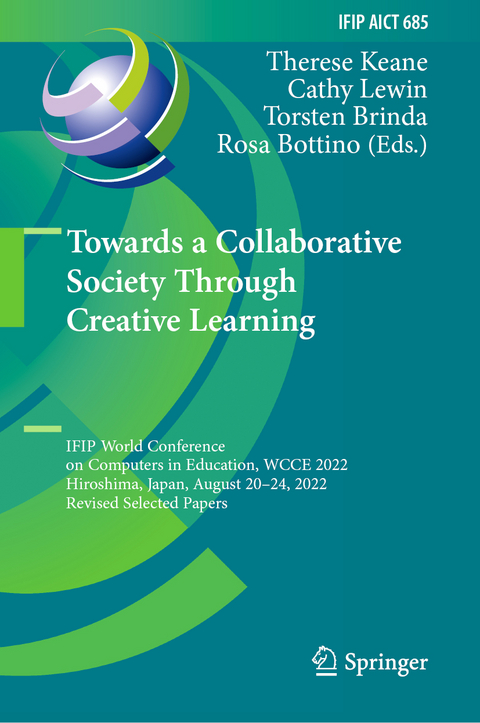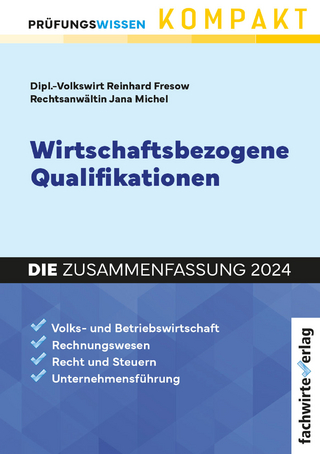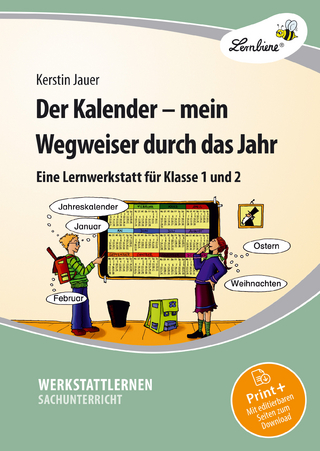
Towards a Collaborative Society Through Creative Learning
Springer International Publishing (Verlag)
978-3-031-43392-4 (ISBN)
This book contains the revised selected, refereed papers from the IFIP World Conference on Computers in Education on Towards a Collaborative Society through Creative Learning, WCCE 2022, Hiroshima, Japan, August 20-24, 2022.
A total of 61 papers (54 full papers and 7 short papers) were carefully reviewed and selected from 131 submissions. They were organized in topical sections as follows: Digital Education and Computing in Schools, Digital Education and Computing in Higher Education, National Policies and Plans for Digital Competence.
Digital Education in Schools.- Digital Education in the Post-Covid Era: Challenges and Opportunities to Explore. - A Study of Measurement of Mentoring Activities Using Text Mining Technology.- Development Plan and Trial of Japanese Language e-Learning System Focusing on Content and Language Integrated Learning (CLIL) Suitable for Digital Education.- STEM Programs at Primary School: Teachers Views and Concerns about Teaching "Digital Technologies".- Fostering Students' Resilience. Analyses Towards Factors of Individual Resilience in the Computer and Information Literacy Domain.- A Workshop of a Digital Kamishibai System for Children and Analysis of Children's Works.- ELSI (Ethical, Legal, and Social Issues) Education on Digital Technologies: In the Field of Elementary and Secondary Education.- EdTech as an Empowering Tool: Designing Digital Learning Environments to Extend the Action Space for Learning and Foster Digital Agency.- Educational Support to Develop Socially Disadvantaged Young People's Digital Skills and Competencies: The Contribution of Collaborative Relationships Toward Young People's Empowerment.- Development and Evaluation of a Field Environment Digest System for Agricultural Education.- Predictive Evaluation of Artificial Intelligence Functionalities of Software: A Study of Apps for Children's Learning of English Pronunciation.- Computing in Schools.- Curriculum Development and Practice of Application Creation Incorporating AI Functions; Learning During After-School Hours.- Assessing Engagement of Students with Intellectual Disabilities in Educational Robotics Activities.- Arguing for a Quantum Computing Curriculum: Lessons from Australian Schools.- Characterization of Knowledge Transactions in Design-Based Research Workshops.- Developing Gender-Neutral Programming Materials: A Case Study of Children in Lower Grades of Primary School.- The Impact of Tolerance for Ambiguity on Algorithmic Problem Solving in Computer Science Lessons.- Symbiotic Approach of Mathematical and Computational Thinking.- What Students Can Learn About Artificial Intelligence - Recommendations for K-12 Computing Education.- What Students Can Learn About Artificial Intelligence - Recommendations for K-12 Computing Education.- What Students Can Learn About Artificial Intelligence - Recommendations for K-12 Computing Education.- Robotics in Primary Education: A Lexical Analysis of Teacher's Resources Across Robots.- Introducing Artificial Intelligence Literacy in Schools: A Review of Competence Areas, Pedagogical Approaches, Contexts and Formats.- What Type of Leaf is It? - AI in Primary Social and Science Education.- Levels of Control in Primary Robotics.- Digital Education in Higher Education.- How ICT Tools Support a Course Centered on International Collaboration Classes.- Multiple Platform Problems in Online Teaching of Informatics in General Education Faced by Part-time Faculty Members.- Design and Effectiveness of Video Interview in a MOOC.- Tracking Epistemic Interactions from Online Game-Based Learning.- Distance Learning in Sports: Collaborative Learning in Ice Hockey Acquisition Processes.- Instructional Methodologies for Lifelong Learning Applied to a Sage Pastel First-Year Module.- Enhanced Online Academic Success and Self-Regulation Through Learning Analytics Dashboards.- Analysis of Facial Expressions for the Estimation of Concentration on Online Lectures.- Development of Education Curriculum in the Data Science Area for a Liberal Arts University.- Educational Data Mining in Prediction of Students' Learning Performance: A Scoping Review.- Using a Cloud-Based Video Platform for Pre-Service Teachers' Reflection.- Using a Cloud-based Video Platform for Pre-Service Teachers' Reflection.- Awarenedd Support with Mutual Stimulation among People to Enrich Group Discussion in AIR-VAS.- Foundations of Computer Science in General Teacher Education - Findings and Experiences from a Blended-Learning Course.- Digital Innovation in Assessment during Lockdown: Perspectives of Higher Education Teachers in Portugal.- The Role of Technology in Communities of Learning Collaboration and Support.- Trends of Checklist Survey of Computer Operational Skills for First-Year Students: Over the Past Four Years.- A Conceptual Framework for Automatic Generation of Examinations using Machine Learning Algorithms in Learning Management Systems.- Developing Informatics Modules for Teachers of All Subjects Based on Professional Activities.- Informatics for Teachers of All Subjects: A Balancing Act between Conceptual Knowledge and Applications.- A System to Realize Time- and Location-Independent Teaching and Learning Among Learners Through Sharing Learning-Articles.- Computing in Higher Education.- Evaluation of a System for Generating Programming Problems Using Form Services.- Evaluation of a Data Structure Viewer for Educational Practice.- Automated Reporting of Code Quality Issues in Student Submissions.- Improvement of Fill-in-the-blank Questions for Object-Oriented Programming Education.- Cycles in State Transition as Trial-and-Errors in Solving Programming Exercises.- Web Application Development Achievement: Clarifying the Relationship Between Visual GUI Design and Textual Programming.- Improving a Model-Based Software Engineering Capstone Course.- A Feasibility Study on Learning of Object-Oriented Programming Based on Fairy Tales.- A Feasibility Study on Learning of Object-Oriented Programming Based on Fairy Tales.- IDE Interactions of Novices Transitioning Between Programming Environments.- Mitigating Accidental Code Plagiarism in a Programming Course through Code Referencing.- National Policies and Plans for Digital Competence.- Senior Computing Subjects Taught Across Australian States and Territories.- Implications for Computer Science Curricula in Primary School: A Comparative Study of Sequences in England, South Korea, and New Zealand.- Where is Technology in the 'Golden Thread' of Teacher Professional Development?.- Understanding the Stakeholder Perspectives on Assessing Educators' Digital Competence.- National Policies and Services for Digital Competence Advancement in Estonia.- Digital Technologies for Learning, Teaching and Assessment: Tackling the Perennial Problem of Policy and Practice.
| Erscheinungsdatum | 29.09.2023 |
|---|---|
| Reihe/Serie | IFIP Advances in Information and Communication Technology |
| Zusatzinfo | XIX, 699 p. 150 illus., 126 illus. in color. |
| Verlagsort | Cham |
| Sprache | englisch |
| Maße | 155 x 235 mm |
| Gewicht | 1187 g |
| Themenwelt | Schulbuch / Wörterbuch ► Unterrichtsvorbereitung ► Unterrichts-Handreichungen |
| Mathematik / Informatik ► Informatik | |
| Schlagworte | Applications • Computer Science • conference proceedings • Informatics • Research |
| ISBN-10 | 3-031-43392-0 / 3031433920 |
| ISBN-13 | 978-3-031-43392-4 / 9783031433924 |
| Zustand | Neuware |
| Haben Sie eine Frage zum Produkt? |
aus dem Bereich


